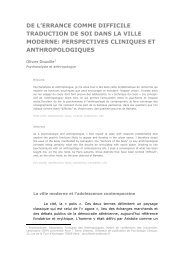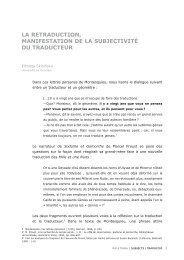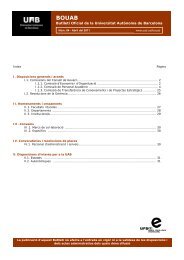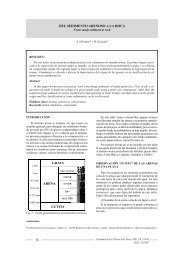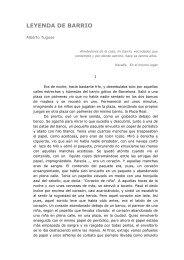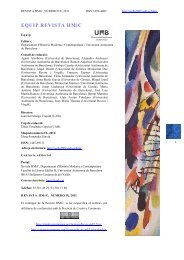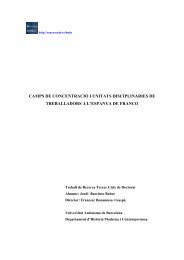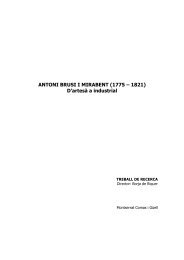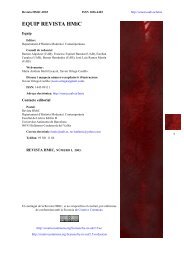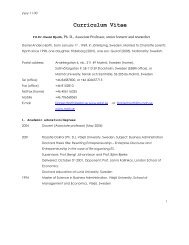EQUIP REVISTA HMiC - Universitat Autònoma de Barcelona
EQUIP REVISTA HMiC - Universitat Autònoma de Barcelona
EQUIP REVISTA HMiC - Universitat Autònoma de Barcelona
Create successful ePaper yourself
Turn your PDF publications into a flip-book with our unique Google optimized e-Paper software.
The mo<strong>de</strong>rnisation of China and the Chinese critique of mo<strong>de</strong>rnity<br />
International law is a separate field of knowledge and requires special terminology.<br />
There were times when we could not find a proper Chinese term to ren<strong>de</strong>r the original<br />
expression, so our choice of words would seem less than satisfactory. Take the character<br />
quan, for example. In this book the word means not merely the kind of power one has<br />
over others, but something every ordinary person is entitled to. Occasionally, we would<br />
add the word li [to form a compound], as, for example, in the expression quanli, meaning<br />
the born “rights” of the plebeian, etc. At first encounter, these words and expressions<br />
may seem odd and unwieldy, but after seeing them repeatedly, you will come to realize<br />
that the translators have really ma<strong>de</strong> the best of necessity.<br />
In<strong>de</strong>ed, as I have suggested, the noun quan commands a broad spectrum of meanings<br />
associated with “power,”" “privilege,” and “domination” in the Chinese usage, much as<br />
the word li brings to mind “interest,” “profit,” and “calculation.” Lurking behind the<br />
ren<strong>de</strong>rings of “rights" and "human rights," these banished meanings can always come<br />
back to haunt the super-sign and unwittingly open up the word “right” or “human rights”<br />
to its suppressed “other” meanings such as “privilege” and “entitlement.” The subtext of<br />
“excess” signification thus glosses the self-evi<strong>de</strong>nt meaning of the English word “right”<br />
with something more than it ostensibly says. This is not to say that the translators were<br />
incapable of comprehending the true meaning of “right.” On the contrary, the “excess”<br />
signification seems to heed the historical message of “rights” discourse in the practice of<br />
international law only too well, because it registers the fact that the i<strong>de</strong>a had been<br />
brought into China by the nineteenth-century representatives of European International<br />
law who had asserted their “tra<strong>de</strong> rights” and the “right” to inva<strong>de</strong>, plun<strong>de</strong>r, and attack<br />
the country. Their language of “rights” cannot but convey a loud message of threat,<br />
violence, and military aggression to the Qing government at the negotiation table and to<br />
the Chinese population at large. (Liu 2004, 124-131)<br />
Since the mid-1990’s there has been a very lively <strong>de</strong>bate about mo<strong>de</strong>rnity in China (Wang<br />
2003; Fewsmith 2001, Saussy 2001) that has followed various lines of inquiry. A “New<br />
Enlightenment” movement tends to <strong>de</strong>fend the introduction of “Western” mo<strong>de</strong>rnity into China<br />
in its manifestation as Capitalism as a means of creating free markets, eliminating government<br />
interventionism and promoting <strong>de</strong>mocracy. A “New Left” movement <strong>de</strong>constructs “Western”<br />
mo<strong>de</strong>rnity, including its manifestation as Socialism, as a means of criticising the abuses of<br />
power and corruption that have accompanied the marketisation of the Chinese economy, society<br />
and politics, while advocating transparency and social <strong>de</strong>mocracy. A “New Right” movement<br />
advocates the use of the apparatus of the Party-State to impose market conditions, without<br />
extending transparency and <strong>de</strong>mocracy. As a result of this lively state of <strong>de</strong>bate, contemporary<br />
Chinese historians and social scientists are re-examining both the origins and consequences of<br />
“Western” mo<strong>de</strong>rnity, and the introduction of mo<strong>de</strong>rnity into China, with special attention to the<br />
concepts of mo<strong>de</strong>rnity held by Chinese intellectuals and reformers in the late 19 th -early 20 th<br />
century and after the 1980’s (Liu 1995, 2004; Wang 2003). This inquiry, and the <strong>de</strong>bates it<br />
inspires, benefit from the postcolonial and postmo<strong>de</strong>rn situation of a younger generation of<br />
Chinese scholars coming into their own in the early 21st century, most of whom have received<br />
postgraduate training in the social sciences in “the West”, and are i<strong>de</strong>ally placed to be able to<br />
use both “Western” theories and methodologies of analysis and inquiry, as well as Marxist<br />
inspired theories and methodologies of analysis and inquiry, to <strong>de</strong>construct both “Western” and<br />
“Asian” grand narratives and conceptual frameworks. The rise of China that Napoleon foresaw<br />
during the Enlightenment benefits from these mo<strong>de</strong>s of inquiry that should also, sooner or later,<br />
come to influence “Western” mo<strong>de</strong>s of analysis and inquiry into mo<strong>de</strong>rnity and postmo<strong>de</strong>rnity.<br />
http://seneca.uab.es/hmic Revista <strong>HMiC</strong>, número IV, 2006<br />
20



